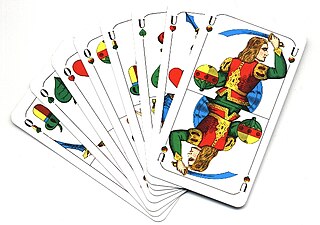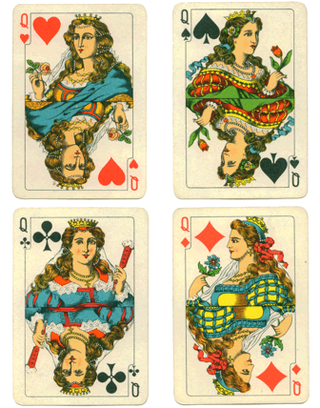Related Research Articles

A trick-taking game is a card or tile-based game in which play of a hand centers on a series of finite rounds or units of play, called tricks, which are each evaluated to determine a winner or taker of that trick. The object of such games then may be closely tied to the number of tricks taken, as in plain-trick games such as contract bridge, whist, and spades, or to the value of the cards contained in taken tricks, as in point-trick games such as pinochle, the tarot family, briscola, and most evasion games like hearts. Trick-and-draw games are trick-taking games in which the players can fill up their hands after each trick. In most variants, players are free to play any card into a trick in the first phase of the game, but must follow suit as soon as the stock is depleted. Trick-avoidance games like reversis or polignac are those in which the aim is to avoid taking some or all tricks.

Skat, historically Scat, is a three-player trick-taking card game of the Ace-Ten family, devised around 1810 in Altenburg in the Duchy of Saxe-Gotha-Altenburg. It is the national game of Germany and, along with Doppelkopf, it is the most popular card game in Germany and Silesia and one of the most popular in the rest of Poland. A variant of 19th-century Skat was once popular in the US. John McLeod considers it one of the best and most interesting card games for three players, and Kelbet described it as "the king of German card games."

Schafkopf, also called Bavarian Schafkopf, is a popular German trick-taking card game of the Ace-Ten family for four players that evolved, towards the end of the 19th century, from German Schafkopf. It is still very popular in Bavaria, where it is their national card game played by around two million people, but it also played elsewhere in Germany and in Austria. It is an official cultural asset and important part of the Old Bavarian and Franconian way of life. Schafkopf is a mentally demanding pastime that is considered "the supreme discipline of Bavarian card games" and "the mother of all trump games."

Doppelkopf, sometimes abbreviated to Doko, is a trick-taking card game for four players.

Königrufen or Königsrufen is a four-player, trick-taking card game of the tarot family, played in Austria and Southern Tyrol, with variants for two, three and six players. As with other regional tarot card games, it is usually called Tarock by its players. It is the only variant of Tarock that is played over most of Austria and, in 2001, was the most popular card game in Austria after Schnapsen and Rommé. By 2015, it had become "the favourite card game of Austrians". It has been described as the most interesting tarot game for four players, the "Game of Kings", a game that requires intelligence and, with 22 trumps in play, as good "training for the brain".

The following is a glossary of terms used in card games. Besides the terms listed here, there are thousands of common and uncommon slang terms. Terms in this glossary should not be game-specific, but apply to a wide range of card games. For glossaries that relate primarily to one game or family of similar games, see Game-specific glossaries.

Bauerntarock also called Brixentaler Bauerntarock or Brixental Tarock, is a point-trick card game played in the Brixental, Austria. It may have originated in the 19th century either as an adaptation of 54-card Tapp Tarock onto the cheaper and smaller 36-card German pack. Another possibility is that it was adapted from the 78-card Grosstarock or Taroc l'Hombre game as the ratio of trumps to non-trumps is almost the same. It uses the Skat Schedule found in popular regional games such as Jass and Schafkopf. It is closely related to Bavarian Tarock, German Tarok, Württemberg Tarock and especially Dobbm. Like Bavarian Tarock and Tapp, Brixental Bauerntarock and Dobbm do not belong to the true tarot games, but have adopted rules from Tapp Tarock. The most fundamental difference between these games and true tarot games is in the use of German or French decks instead of true Tarot playing cards.

Officers' Skat (Offiziersskat), is a trick-taking card game for two players which is based on the rules of Skat. It may be played with a German or French pack of 32 cards which, from the outset of the game, are laid out in rows both face down and face up. As in Skat, tricks are taken and card points counted to determine the winner of a round; game points are then awarded to decide the winner of a game. It is also called Two-hand Skat, Sailors' Skat (Seemannsskat), Farmers' Skat (Bauernskat), Robbers' Skat (Räuberskat) or Coachmen's Skat (Kutscherskat)

German Schafkopf is an old German card game and the forerunner of the popular modern games of Skat, Doppelkopf and Bavarian Schafkopf. Today it is hardly ever played in its original form, but there are a number of regional derivations.
Schneider is a term used in many card games for a low card point score that results in boosting an opponent's game score. The threshold is usually half the total points needed for a win; below the threshold, the player or team is Schneider; above it they are 'out of Schneider'. Its natural extension is Schwarz, said of a player or team who loses the game without taking a single trick.

Bavarian Tarock or, often, just Tarock, is a card game that was once popular in Bavaria and also played in parts of Austria as well as Berlin. The name is a clue to its origin in the historical German game of [Gross-]Tarock, a game using traditional Tarot cards. At some point in the mid- to late-18th century, attempts were made to emulate Taroc using a standard 36-card German-suited pack, resulting in the formerly popular, south German game of German Tarok. During the last century, the variant played with a pot (Haferl) and often known as Bavarian Tarock or Haferltarock, evolved into "quite a fine game" that, however, has less in common with its Tarock progenitor. German Tarok also generated the very similar game of Tapp, played in Württemberg, and both are related to Bauerntarock, Dobbm and the American games of Frog and Six-Bid Solo. Bavarian Tarock should not be confused with Königrufen, also known as Austrian Tarock or just Tarock.

Strohmandeln, also called Strohmandel, Strohmanntarock, Strohmanntarok, Zweiertarock, Strawman Tarock or Straw Man Tarock, is an old, two-hand card game from the Austrian branch of the Tarock family. It takes its name from the three-packet talon of four cards, the Strohmänner ("strawmen"), each player has at the start of the game. While the original game has been described as jejune, it was eventually superseded by an attractive successor which is both challenging and very exciting.

Zwanzigerrufen or Zwanz'gerrufen is the leading trick-taking card game of the Tarock family in many regions of eastern Austria. Its rules are simpler than the game of Königrufen which is more widely played in the whole of Austria. As is common in Tarock games, the cards have various point values – the primary goal in an individual game is to win the majority of points.

Illustrated Tarock or Illustrated Dreiertarock is an Austrian card game that has been described as the "queen" of all three-handed Tarock games played with the 54-card pack. It was thought by Mayr and Sedlaczek to be extinct but, in 2009 when the two Tarock authors were guests on an ORF radio programme, players from Vienna called in who confirmed they still played the game. It is sometimes called Point Tarock which, however, is a different, probably extinct, game, albeit a close cousin. Although it has "a reputation for being a little more convoluted than the others", Furr maintains that this is not so, but recommends that players become familiar with Tapp Tarock before attempting this game.

Droggn, sometimes called French Tarock is an extinct card game of the Tarock family for three players that was played in the Stubai valley in Tyrol, Austria until the 1980s. Droggn is originally local dialect for "to play Tarock", but it has become the proper name of this specific Tarock variant. An unusual feature of the game compared with other Tarock games is the use of a 66-card deck and that, until recently, there was no record in the literature of a 66-card game and no current manufacturers of such a deck. The structure of the game strongly indicates that it is descended from the later version of Tarok l'Hombre, a 78-card Tarock game popular in 19th-century Austria and Germany, but with the subsequent addition of two higher bids.
Grosstarock is an old three-handed card game of the Tarock family played with a full 78-card Tarot pack. It was probably introduced into the southern German states around 1720 but spread rapidly into Austria and northwards as far as the Netherlands and Scandinavia. It only survives today in Denmark where it is called Tarok.

The following is a glossary of Skat terms used in playing the card game of Skat. Although Skat has German origins, it has now become an international game, often played to official rules. This glossary includes terms which are common or regional, official or unofficial, as well as those used for special situations, starting hands, card combinations and terms relating to players. Many of the terms are also used in other trick-taking or Ace-Ten games or even in card games in general.
Herzblatt or Herzblättchen is a German card game of the Ace-Ten family for two to five players. It bears a certain resemblance to the extinct 19th-century game of Piquesept, however without the special rules associated with the trump Seven.

Dreierles is a three-handed, trick-taking Tarot card game that is popular in the German region of central Baden. It is very old and appears to be a south German cousin of Tapp Tarock, the oldest known 54-card Tarot game. Dreierles is played with Cego cards - the only surviving German Tarot cards still produced. German soldiers fighting with Napoleon almost certainly introduced a Spanish modification to Dreierles that produced Baden's national game of Cego. Its relative simplicity makes it a good introduction to games of the central European Tarot family, usually called Tarock games.

Baśka is a fast-moving, Polish card game for four players played using traditional French-suited playing cards. It uses a shortened pack of just 16 cards and is similar to Kop which is also played in Poland. Both are derived from German Schafkopf.